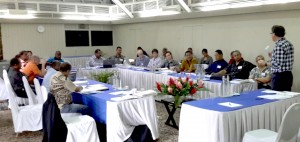
ASU delivers workshop on wind energy in Fiji

Participants listen to a presentation on wind energy at a recent Arizona State University workshop in Fiji.
A two-day workshop for policymakers, focused on small wind energy systems, recently was held in Fiji by Arizona State University’s Vocational Training and Education for Clean Energy program.
This global program, funded by the U.S. Agency for International Development, works to improve renewable energy infrastructure and investments in developing countries by increasing awareness, knowledge and capacity of local stakeholders, primarily in decentralized clean energy technologies.
The April 5-6 workshop was held in Nadi, Fiji, and led by ASU, in cooperation with the International Union for Conservation of Nature’s regional Oceania program.
“Wind energy can provide an optimum mix of renewable energy system in some parts of the Pacific region,” said Anshuman Razdan, a professor in the Department of Engineering at ASU’s College of Technology and Innovation, and the administrative principal investigator of the training and education program. Razdan also is the director of ASU’s Advanced Technology Innovation Center.
The workshop covered the energy market, resource assessment, siting tools and procedures, turbine technology, economics and policies, and environmental considerations for siting wind energy projects.
Wind power can give Pacific Island nations a mix of renewable resources to provide round-the-clock energy. Small wind turbines, ranging from 15 kilowatts to 100 kilowatts, can provide a continuous flow of energy to remote rural areas, reducing the emission of greenhouse gases and dependency on imported fossil fuels.
Workshop participants included 32 high-level officials and policymakers, including representatives of Pacific-based donors and local non-governmental organizations. They included senior government and industry officials from the Cook Islands, Micronesia, Fiji, Kiribati, the Marshall Islands, Palau, Samoa, the Solomon Islands, Tonga, Tuvalu and Vanuatu.
Other attendees included regional and donor representatives from the United Nations Development Program, the Secretariat of the Pacific Community, the International Renewable Energy Agency, the Secretariat of the Pacific Regional Environment Programme, the European Union and The University of the South Pacific.
John Hogan, director of the Economic Development Division at the Secretariat of the Pacific Community, told participants about the importance of building capacity of renewable energy, including wind. He said the training furthers the work that the Secretariat is coordinating under the Framework for Actions for Energy Security in the Pacific.
Dennis Scanlin, professor and coordinator of the Appropriate Technology Program at Appalachian State University in North Carolina, and Ambika P. Adhikari, a research program manager at ASU’s Office of Knowledge Enterprise and Development, discussed the technical, financial and environmental issues involved in assessing the viability and introduction of small wind energy technology.
Workshop leaders noted that wind energy in the Pacific region depends on financing and funding policies, including government subsidies, tax incentives, penalties and rebates.
Media contact:
Judy Nichols, [email protected]
Ira A. Fulton Schools of Engineering
480-965-9248



































